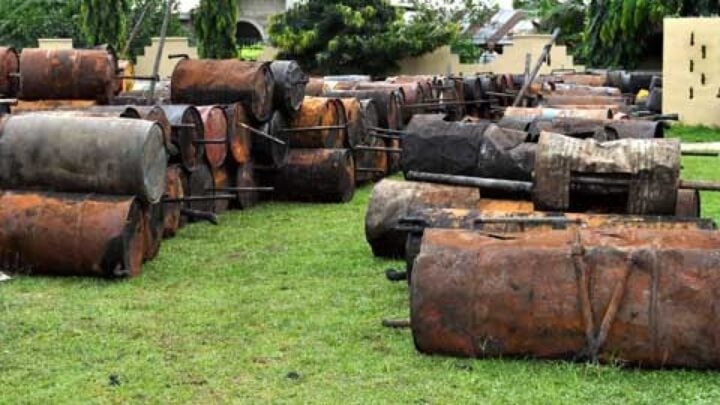Oil producers in Nigeria say the negative impact of illegal oil bunkering is eroding gains, calling on the federal government to tackle the menace in the Niger Delta.
In a statement made available to TheCable, the indigenous producers said oil thieves are raking in ‘petrodollars’ while Nigeria is bedevilled by low production.
Nigeria and oil producers have been in a longstanding battle with illegal oil bunkers for decades, an activity that has resulted in significant losses for Africa’s biggest economy.
The illegal activities also affected monthly revenue remittance to the federation account. In January, TheCable reported that the Nigerian National Petroleum Company (NNPC) Limited did not remit any money to the federation account.
Advertisement
On average, Nigeria loses about 200,000 barrels per day, according to Nigerian National Petroleum Company (NNPC) Limited.
In its July 2021 audit report, the Nigeria Extractive Industries Transparency Initiative (NEITI) said Nigeria lost 42.25 million barrels of crude oil to oil theft, valued at $2.77 billion in 2019.
“People are making petrodollars on the high seas, while we are experiencing fall in production volumes,” a source told TheCable.
Advertisement
The source said indigenous producing companies are the worst hit by oil bunkering, noting that the strides recorded over the years in gaining a foothold in Nigeria’s upstream oil sector were gradually being eroded by oil theft which is also aided by the rising crude oil prices in the international market.
The price of the international benchmark, Brent Crude, for the better part of 2021, and this year has been above $100 per barrel mark, jumping seven-year high to over $130 this week.
He added that Nigeria’s Bonny Light and other blends in the country are also selling within that range, but oil bunkering is impeding their fortunes.
“The thieves are cashing in on rocking prices, and there is a noticeable presence of barges and vessels in the creeks loading stolen oil from pipelines and transporting to large vessels on the high seas,” he said.
Advertisement
The source said crude oil theft is highest just after the flow station as it is after the primary treatment, hence, the flow is of higher quality and easier to handle by the crude refiners.
The producers revealed that the ENI-operated pipeline to brass terminal appears to be a favourite of many oil thieves. They further noted that the AITEO-Nembe Creek Trunkline is also recording heavy losses; as well as Chevron’s production to Escravos and, to some extent, the TransForcados pipeline.
Abdulrasaq Isa, president of the independent petroleum producers’ group, the umbrella group for indigenous oil producers, had decried the challenges of oil theft.
“The key challenges now are in the areas of security and high operating costs. ’’We look forward to the government in finding long-lasting and sustainable solutions to these challenges,” Isa said.
Advertisement
The eastern naval command of the Nigerian Navy disclosed recently that it had deactivated 175 illegal refineries while arresting 27 vessels under 11 months in its areas of operations in 2021.
In September last year, the federal government set up a committee on the recovery of crude oil and illegally refined petroleum products.
Advertisement
The group comprised the Nigerian Upstream Petroleum Regulatory Commission (NUPRC; formerly DPR), the Nigeria National Petroleum Company Ltd., the National Oil Spill Detection and Response Agency, the Nigerian Army and Navy, and the Nigeria Security and Civil Defence Corps.
An executive of an international oil company, who does not want to be identified due to the sensitivity of the matter, said while there is so much talk about oil spills, much more oil revenue is lost to the sale of stolen oil on the high seas, where the major challenges lie.
Advertisement
Dakuku Peterside, immediate past director-general/CEO of Nigerian Maritime Administration and Safety Agency (NIMASA), estimated that 80 percent of the stolen oil is exported, while the balance of 20 percent goes into illegal refining in “refineries” dotting the landscape of the Niger Delta creeks.”
“The vessels and the illegal refineries are very conspicuous and visible to be noticed, yet these illegal operations have been going on without any significant challenge from government or governmental institutions, including security agencies,” he said.
Advertisement







